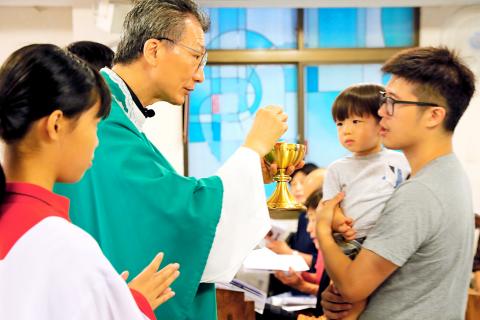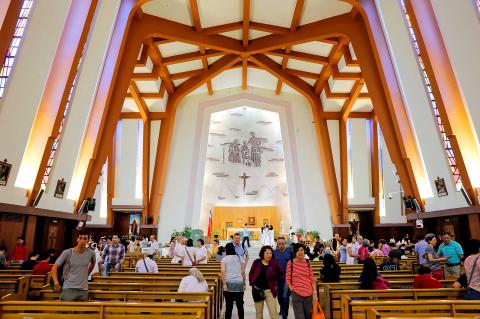Worshipers at Masses in Hong Kong and Taiwan yesterday were largely upbeat about a new deal between China and the Vatican, despite fears Beijing is trying to increase control over the Catholic Church.
Cardinal Joseph Zen (陳日君), the outspoken former bishop of Hong Kong, accused Vatican officials of “selling out” ahead of Saturday’s agreement and in a blog post shortly after the announcement he raised concern over its impact.
“What will the government say to Catholics in China? ‘Obey us, the Holy See is already in agreement with us?’” the cardinal wrote.

Photo: Daniel Shih, AFP
Comments on social media accused the Vatican of turning a blind eye to a “silent cultural revolution” in China, where churches have been destroyed in recent months and there has been a clampdown on Bible sales.
However, churchgoers in Hong Kong gave the deal a cautious welcome.
A parishioner who gave her name as Teresa at the Cathedral of the Immaculate Conception in Hong Kong said: “More contact is positive,” adding that she was not worried warming ties between Beijing and the Vatican would lead to interference in the territory’s Catholic churches.

Photo: Daniel Shih, AFP
Another who gave her name as Nikki said: “Any cooperation between the two sides has to be a good thing, as long as it’s equal cooperation.”
In Taiwan, some worshipers worried the new deal meant the nation would lose its only official ally in Europe.
Online comments on the Liberty Times (the Taipei Times’ sister newspaper) Facebook page accused the Vatican of “dealing with the devil,” but churchgoers remained confident.
“I think the pope’s consideration in signing the agreement is to promote religious freedom rather than establishing diplomatic relations with China, so there is no need to politicize him,” said parishioner Yuan Shi-min at Our Lady of Fatima in Taipei.
China’s 12 million Catholics are divided between a state-run association whose clergy are chosen by the government and an unofficial church that swears allegiance to the pope.
The agreement struck on Saturday was aimed at resolving a decades-old dispute over who gets to name Catholic bishops in China, and could lead to a rapprochement for the first time since diplomatic ties were severed in 1951.
Shortly after the deal was announced, Pope Francis recognized seven clergy appointed by Beijing.
China’s state-supervised Catholic Patriotic Association yesterday reaffirmed its loyalty to the Chinese Communist Party, while welcoming the deal.
The Catholic Church in China said it would “persevere to walk a path suited to a socialist society, under the leadership of the Chinese Communist Party.”
It “deeply loved the motherland” and “sincerely endorsed” the agreement, hoping relations between China and the Vatican would improve further, it added in comments on its Web site.
Additional reporting by Reuters

DEFENDING DEMOCRACY: Taiwan shares the same values as those that fought in WWII, and nations must unite to halt the expansion of a new authoritarian bloc, Lai said The government yesterday held a commemoration ceremony for Victory in Europe (V-E) Day, joining the rest of the world for the first time to mark the anniversary of the end of World War II in Europe. Taiwan honoring V-E Day signifies “our growing connections with the international community,” President William Lai (賴清德) said at a reception in Taipei on the 80th anniversary of V-E Day. One of the major lessons of World War II is that “authoritarianism and aggression lead only to slaughter, tragedy and greater inequality,” Lai said. Even more importantly, the war also taught people that “those who cherish peace cannot

STEADFAST FRIEND: The bills encourage increased Taiwan-US engagement and address China’s distortion of UN Resolution 2758 to isolate Taiwan internationally The Presidential Office yesterday thanked the US House of Representatives for unanimously passing two Taiwan-related bills highlighting its solid support for Taiwan’s democracy and global participation, and for deepening bilateral relations. One of the bills, the Taiwan Assurance Implementation Act, requires the US Department of State to periodically review its guidelines for engagement with Taiwan, and report to the US Congress on the guidelines and plans to lift self-imposed limitations on US-Taiwan engagement. The other bill is the Taiwan International Solidarity Act, which clarifies that UN Resolution 2758 does not address the issue of the representation of Taiwan or its people in

US Indo-Pacific Commander Admiral Samuel Paparo on Friday expressed concern over the rate at which China is diversifying its military exercises, the Financial Times (FT) reported on Saturday. “The rates of change on the depth and breadth of their exercises is the one non-linear effect that I’ve seen in the last year that wakes me up at night or keeps me up at night,” Paparo was quoted by FT as saying while attending the annual Sedona Forum at the McCain Institute in Arizona. Paparo also expressed concern over the speed with which China was expanding its military. While the US

‘FALLACY’: Xi’s assertions that Taiwan was given to the PRC after WWII confused right and wrong, and were contrary to the facts, the Ministry of Foreign Affairs said The Ministry of Foreign Affairs yesterday called Chinese President Xi Jinping’s (習近平) claim that China historically has sovereignty over Taiwan “deceptive” and “contrary to the facts.” In an article published on Wednesday in the Russian state-run Rossiyskaya Gazeta, Xi said that this year not only marks 80 years since the end of World War II and the founding of the UN, but also “Taiwan’s restoration to China.” “A series of instruments with legal effect under international law, including the Cairo Declaration and the Potsdam Declaration have affirmed China’s sovereignty over Taiwan,” Xi wrote. “The historical and legal fact” of these documents, as well